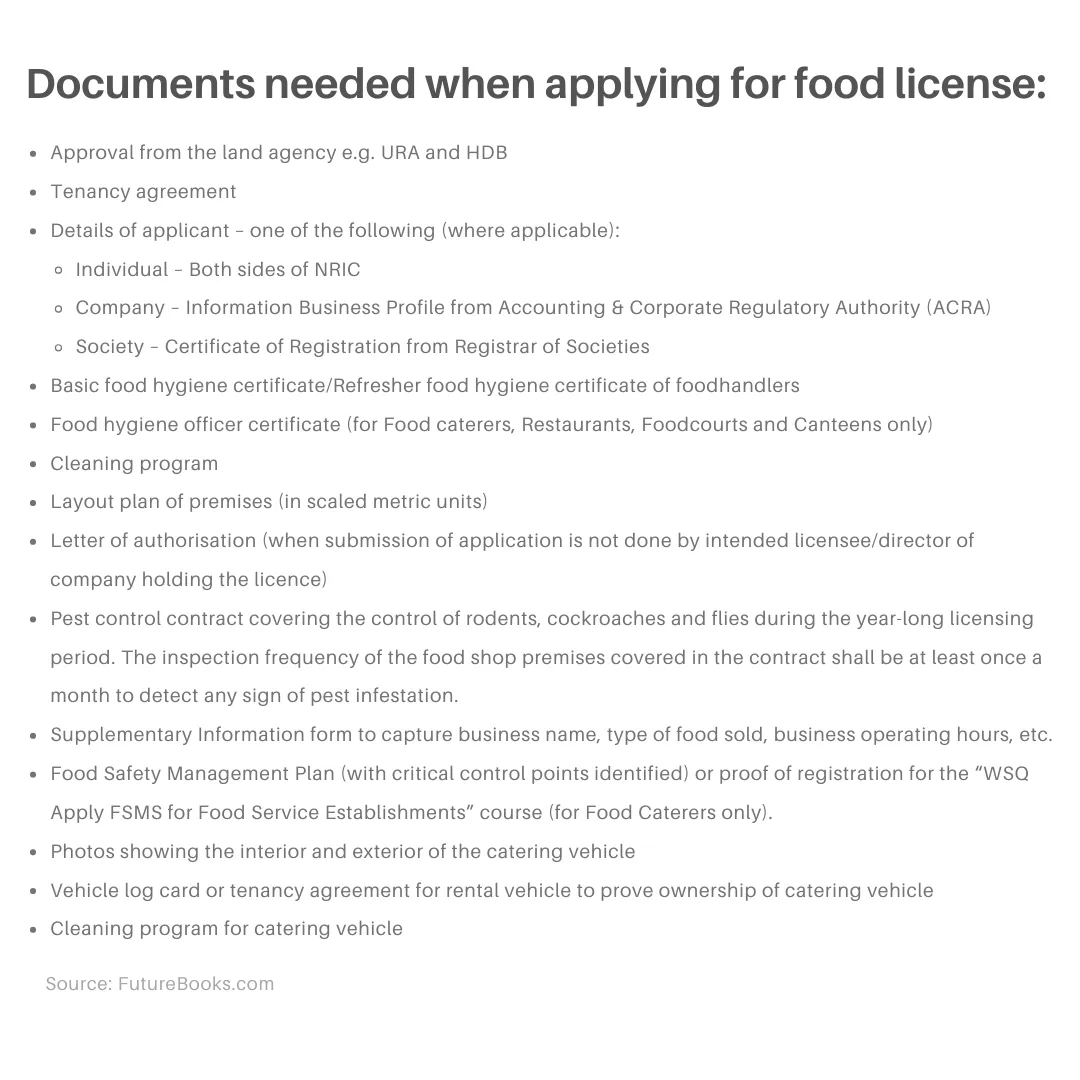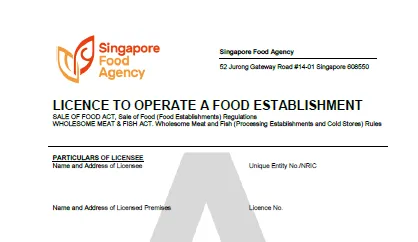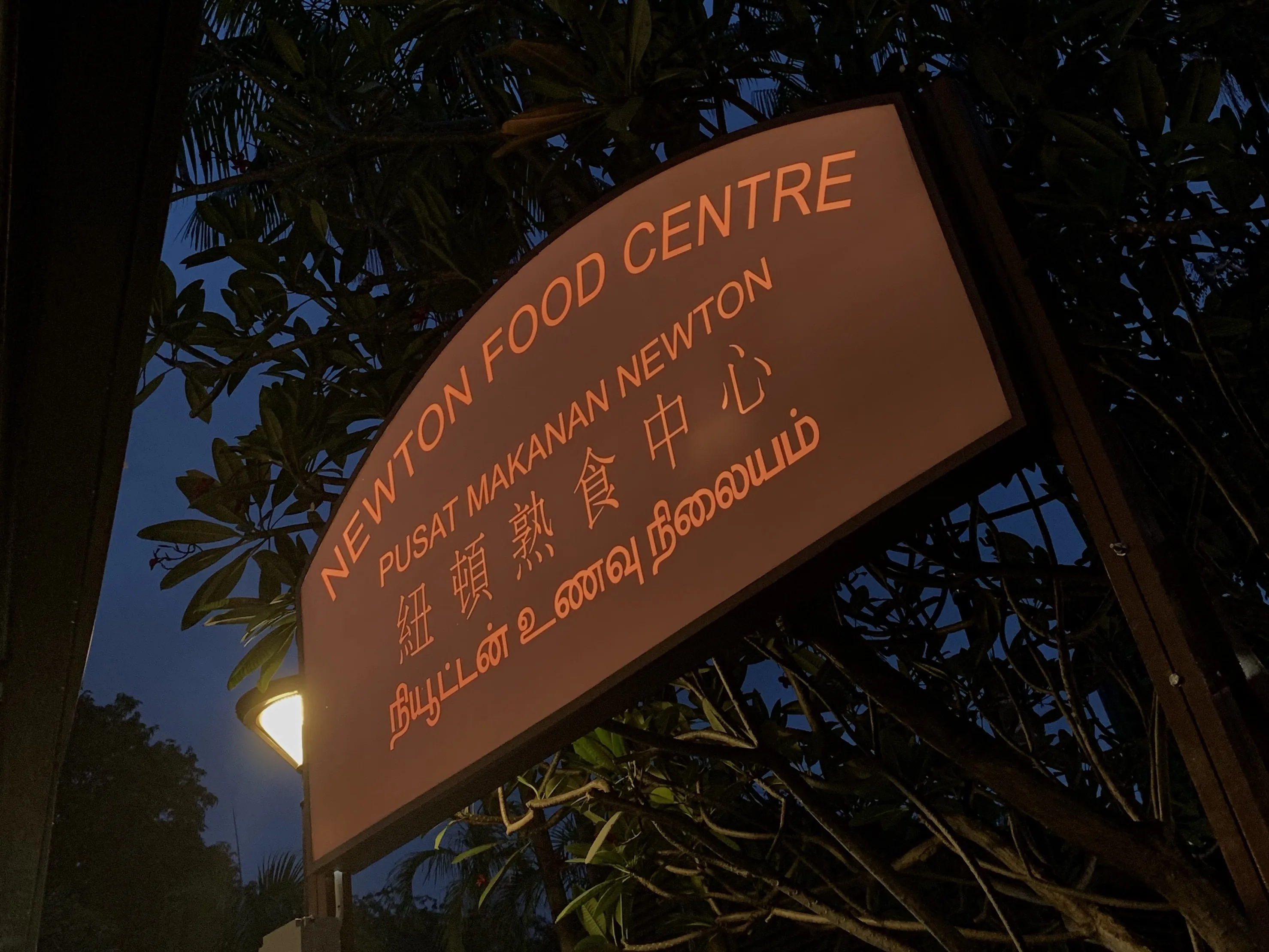Summary
Singapore is nominated to be one of the best destinations for foodies in Southeast Asia. For that same reason, a lot of "food-preneurs" from all around the world are eyeing on Singapore as the next strategic location to set up a food and beverage business.
However, starting a food business in Singapore is not all rainbows and unicorns. Incorporating a restaurant business in Singapore can be quite costly and expensive, which will be the biggest challenge for startups with limited capital.

Nonetheless, Singapore is known for its hassle-free business set-up process and has consistently top World Bank's Ease of Doing Business report. Thus, doing a comprehensive preparation should be helpful in encountering the challenges that you might face in the future.
7 Steps to Set Up a Restaurant in Singapore:
1. Incorporate a Company
First and foremost, you will need to incorporate a company to start a food business legally in Singapore. Completing this initial step will save you a lot of time and other paperwork in the future.
3 Simple Steps to Set Up a Company in Singapore:
1. Choose a business entity
Accounting & Corporate Regulatory Authority (ACRA) has provided a range of options for businesses to decide its entity based on the structure for their needs. The entity types are Partnership, Sole Proprietor, Companies, Limited Liability Partnership, Limited Partnership, and Public Accounting Firm.In deciding which entity suits your business best, there are some things to take into considerations:
- The nature of the business you want to undertake
- Number of owners
- Amount of capital
- Risks are you able to take
- Long term plan for your business
- Advantages and disadvantages of the different business vehicles
- The requirements you need
- Is the business vehicle easy to close
-
Though options exist, many new companies register as Private Limited Companies due to its scalability. Learn more about the types of business entities in Singapore here.
2. Set up your company
As a newly-incorporated company, you will need to purchase a business profile from ACRA to report details information regarding your business, including your registration number (UEN), etc. This profile will be required to open a 'business bank account' or a 'business account' and apply for licenses you may need (types of licenses will be discussed in the next point).To purchase a business file from ACRA, you will need:
- Approved company name by the ACRA
- Minimum of one shareholder
- At least one director that resides in Singapore
- Singapore resident company secretary
- Paid-up capital of at least $1
- Registered physical office address (you may register your home address if your office is in your own private property)
3. Opening your account
After incorporating your company, you can open a 'business bank account' from banks or a 'business account' from other payment service providers in Singapore. A separates business account from your personal account will help you keep business transaction records separate from any personal finances.
Here's an in-depth guide on how you can register your business in Singapore.
2. Apply for License
Singapore is considered strict when it comes to food and beverage establishments. There is quite a list of licenses that you need to take note of before operating your restaurant business:

In addition to that list, you will need to register the license for:
- Liquor license, if you plan to serve alcohol
- Halal license, if you want to serve Halal food
- Import license, if you plan to import the ingredients
- Tobacco license, if you want to sell tobacco in your restaurant
- Register for GST, if your annual revenue exceeds S$1 million
3. Budgeting
Cost is every food entrepreneurs' biggest challenge in operating the business. Thus, doing proper budgeting will be helpful for you to estimate how much you will need to prepare for capital, and how much you will need to spend for monthly expenses.
Average cost of starting a restaurant business in Singapore:
1. Rental
- Core Central Region (CCR): $12 - $18 per square foot
- Rest of Central Region (RCR): $10 - $22 per square foot
- Outside of Central Region (OCR): starting from $6 per square foot
Assuming you need to pay at least for 1,200 square feet, the range of rental cost will be around $7,200 - $26,400 depending on the area of your restaurant. On top of this, you may need to set aside between $4,000 to $6,000 to restore the property to its original state if you should close down the restaurant.
2. Manpower
- Part-time staff typically earn $7 per hour
- Full-time workers typically earn $1,800 to $2,000 per month
- Head chefs typically earn $5,000 to $6,000 per month
- Line cooks and others earn $3,000 to $4,000 per month
Some restaurants provide incentives such as year-end bonuses or share in the business especially for the head chef. Additionally, an extra 16% of your employee's pay should be provided to pay their CPF.

3. License
- Food Shop License from the National Environment Agency (NEA) will cost $195 a year
- Employees who handle food will need to go through the Food Handler's course, it will cost $21.40 for Singaporean employees and $107 for foreigners.
- First Class Liquor License (if you want to serve alcohol from 6am to midnight) will cost you S$1,740 for every two years
- Second Class Liquor License (if you want to serve alcohol between 6am to 10pm) will cost you $1,329 for two years
- In the future, if your annual turnover exceeds $1 million, you will need to register for the Good and Services Tax (GST).
4. Others
- On average, raw ingredients usually will take up 20% of your revenue, although there is no clear cost estimation here.
- Utility bills may cost between $1,200 to $2,500 a month.
- Set aside an extra $3,000 a month for the miscellaneous cost to
4. Choose a Location

One of the most important factors in setting up a restaurant business in Singapore is deciding on the location. You may have the best Steak Frites, the best interior or even the best price. If the location is not convenient for those going by foot or accessible to those driving, you may have missed a big opportunity in obtaining more income.Hence, take your time, be patient and do extensive research on the best location to operate your business. There are many locations available to choose from. It does not have to be in the heart of the CBD area if you don't have the budget yet, but again, it depends on who your target market is.Websites to help you find the best location:
5. Hire Staff
This has been the second biggest challenge for food business owners in Singapore (after the cost of starting a business). Although Singapore has millions of people, it has been proven that hiring staff is difficult due to the low local demands and certain restrictions in hiring foreign labor.Here is a list of staffs that are commonly needed to operate a restaurant business:
- Executive Chef/ Kitchen Manager
- Restaurant Manager
- Server
- Bartender
- Host
- Dishwasher
- Bookkeeper or Accountant.
- Maintenance
However, if your food business is relatively small and makes more sense to have people do multiple roles, it will be better as it will cut down labor cost.
6. Find Suppliers
As previously mentioned in the breakdown of cost, ingredients may take up to 20% of your revenue. Hence, getting suppliers with the best price while maintaining its quality will be very beneficial in the long run.
Here are some local food suppliers you can consider, as recommended by The Smart Local:
1. Ban Lee Heng Kway Teow - East Singapore
Kway Teow, Mee Pok, Vermicelli, and their friends. You can grab a gargantuan for $2 per kg, sold only a packet of 3kg. Compare that to $1.50 for 400g at Cold Storage.
Original Price: $7 for 3 kg packet of beehoon
Wholesale Price: $6 per 3 kg packet of beehoon
Address: 3017 Bedok North Street 5 Gourmet East Kitchen #04-23, Singapore 486121
Contact: +65 6298 3958
Opening Hours: 5 am – 6 or 7 pm (best to go before 6pm because their closing time is not fixed)
2. Q.B. Food Trading Pte Ltd - West Singapore
From pizza to crepes, Q.B. Food Trading Pte Ltd provides quality food at discounted prices. At the factory, you can collect your ordered items online and also buy anything else off the shelves.
Original Price: $58.90 for 1 KG of SAVOUR Australian Fresh Beef Striploin at Cold Storage
Wholesale Price: $28.30 for 1 KG of Hunter Valley Australia Grass-Fed Striploin (While this may not be the best comparison because the brands are different, it gives you an idea of how the prices for Australian Striploin steak can differ vastly between supermarkets and food factories!)
Address: 8 Chin Bee Crescent, Singapore 619893
Contact: +65 6261 6410
Opening Hours: 9 am – 6 pm
Website:https://www.qbfood.com.sg

3. Fassler - North Singapore
The place for fresh seafood in Singapore. From Scallop Chowder to Hungarian Beef Goulash Soup, Fassler has the most extensive frozen soup selection in Singapore.This is also where you should go for all your fresh seafood purchases. Fassler sells pre-sliced think and fleshy salmon sashimi. At $14.80 for 300g (approximately 34 slices), probably one of the cheapest sashimi with high quality in Singapore.
Address: 46 Woodlands Terrace, Singapore 738459
Contact: 6257 5257
Opening Hours: 8pm – 5pm (Mon to Fri), 8pm – 1pm (Sat)
Website: https://fasslergourmet.com
7. Partnership
Last but not least, do partnerships that can help improve your customers' experience. For example, by working with food delivery companies. Some famous food delivery services in Singapore are Food Panda, Deliveroo, Grab Food and Why Q (for Hawker foods).

Additionally, you can also work with companies like GrabPay and FavePay to provide additional payment methods, providing customers with more options on what is more convenient for them.
Key Takeaways
Setting up a restaurant business in Singapore should not be a burden if you have done your research and preparation. The government and many other private services have provided the support that you might need to reach your dreams.
- Register a company to save you from a lot of time and work in the future
- Apply for licenses needed for a restaurant to fully operate in Singapore, including liquor license, halal license, etc
- Do the proper budgeting including all the costs that may occur when your restaurant operates
- Take your time in choosing the right location to operate
- Hire staffs
- Find the right supplier
- Do some partnerships for a better customer experience
Ready to register your restaurant business in Singapore? We got you covered!
Aspire and Osome partners to offer the first same-day online incorporation and business account opening in Singapore from anywhere in the world.
This partnership will bring more convenience, ease and speed for directors who want to open a business in Singapore. This new service is 16% cheaper than doing both processes separately on your own.










%201.webp)


.webp)